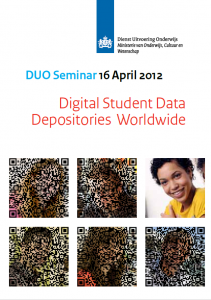Student data administrations worldwide nowadays keep their data mostly in digital form. Whether they be centralized in a national government unit, situated in a consortium of higher education institutions, or perhaps situated in a private, not-for-profit organisation, these bodies usually serve national purposes – often, the administration of student data follows logically from managing student finance or student loan systems. And the scope of these administrations is usually limited to serving nationally oriented student mobility.
Is there a compelling reason why this would be kept this way? No, there isn’t, says DUO. DUO, in Dutch short for Dienst Uitvoering Onderwijs, stores student data since 1988, to carry out the Netherlands national student finance scheme for vocational secondary and tertiary education. That still is one of DUO’s primary tasks.
However, DUO wants to put student data at the disposal of the students themselves. Students should be able to get access to their data through e-authentication. It is for this reason that DUO has been developing the Dutch national diploma register. This national digital student data repository contains all data on Dutch students, ranging from primary education up to and including tertiary education. The diploma register is citizen-oriented – basically, it is the citizen who may consult his/her educational records in the diploma register and share these with others. To do so, citizens have to log in on the diploma register, using their personal, national digital identity code (DigiD).
Starting in 2012, Dutch citizens will get access to the diploma register. Higher education institutions in the Netherlands will be authorized to check new applicants against the diploma register holdings – a consultation authorized by a student’s application for admission to a study programme. The provision and consultation of these data would dovetail with the verification needs of the Internal Market Information System IMI, and with Europass, two EC instruments that DUO is involved in as designated authority for professional recognition, and as leading agent of the Netherlands National Europass Center (NEC).
This would free citizens from time consuming and unreliable paper document based authentications (legalisations), and at the same time would minimize the risk of diploma fraud for higher education institutions and employers. DUO firmly believes that its diploma register will significantly contribute to the free cross border movement of students and workers – in short, the diploma register will facilitate Life Long Learning by providing citizen centred verification and validation possibilities, on the basis of consolidated personal data that will be stored for the duration of that citizen’s active student and working life (data stored ≥ 50 years), while complying with all Dutch legal privacy requirements.
Thus, Digital Student Data Depositories Worldwide might take off on a global level, with immediate relevance for two out of seven current EC Flagships Initiatives – Youth on the Move and Digital Agenda for Europe. This can also contribute towards other important EC policy lines, like Less bureaucracy for citizens; Life Long Learning; IMI (Internal Market Information System); Europass; the European Interoperability Framework for European Public Services; SEMIC; and it might provide bricks (such as the IT infrastructure) to help build EC projects like the Student Lending Facility at European Level, the EUA headed project Mapping University Mobility of Staff and Students (MAUNIMO), and the Europe 2020 target to provide more statistical details on international student mobility – see Commission regulation (EU) No88/2011 concerning the production and development of statistics on education and lifelong learning.
DUO is convinced that there are more systems similar to DUO’s that might help facilitate student and worker mobility, by providing digital evidence that does away with physical, paper documents and the concomitant risks of document fraud and identity fraud.
This global founding seminar seeks to find common ground in the use of digital student data for the purpose of global mobility, by bringing together the worlds of systems administrators, software developers and stakeholders at the receiving end of the students’ digital data. To find that common ground, DUO hosts this two-day event, where stakeholders will have a chance to freely mingle and meet, get hands-on experience, exchange views, and engage in global cooperation efforts. This link will give you some idea of the way digital student data repositories develop all over the world.
On day 1, high level administrators are invited to publicly address the issues revolving around digital student data, followed in the afternoon by two rounds of simultaneous workshops that will showcase current best practices and the key themes ‘ID management’ and ‘e-portfolios’. Our host for day 1 will be the University of Groningen, which graciously offered its renowned historic Academy Building as venue for our meeting.
Day 2 is meant as the annual workshop of RS3G, the Rome Student Systems and Standards Group. RS3G is an established group of software implementers and stakeholders in the European Higher Education domain, focused on contributing to the definition and adoption of standards and procedures for the exchange of data, to facilitate student mobility and lifelong learning. The new DUO main office in Groningen will be the venue for day 2.

